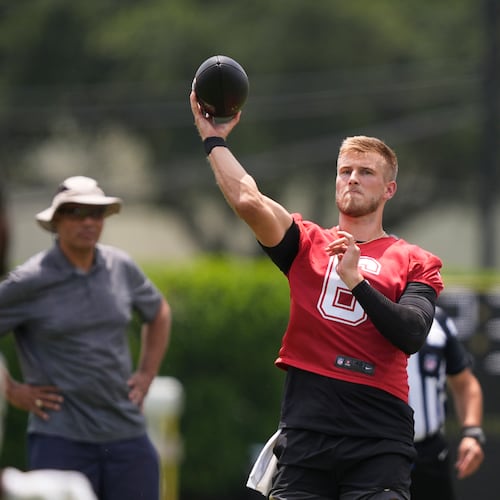In August, when the Falcons were drop-kicked by Cincinnati in their first exhibition game 34-10, the powers that be in the organization assured us it didn’t matter. Three more preseason losses followed, but nobody showed any concern, nobody screamed, nobody issued any public mandates.
Then 0-4 in the preseason turned into 4-12 in the regular season, and we came to realize those early losses had meaning. Injuries and personnel problems were obvious issues, but it’s still worth wondering: If somebody in the Falcons’ organization had attached a little more significance to the team’s lack of physical presence and sense of urgency in August, would it have made a difference in September, October and beyond?
Consider the alternate universe.
In August, the Denver Broncos lost a preseason game at Seattle 40-10. John Elway didn’t brush it off. He left his seat in the executive suite, went down to the Denver locker room and reamed out everybody in earshot.
As it turns out, teams that are serious about winning championships don’t consider anything meaningless. Elway, the team’s third-year executive and Hall of Fame quarterback, told his players: “You don’t lose 40-10 to anybody and expect to be a champion.”
“John pretty much laid into us,” Broncos quarterback Peyton Manning recalled this week. “He was not happy with that game. It was a butt-kicking. Whether it was preseason or regular season, he was just sharing his thoughts that that wouldn’t be accepted by him while he was a leader of this organization.
“I was taking notes. A lot of players were taking notes. He talked about what our potential could be, and he didn’t want to see that wasted. I think guys got the message. If I was reading it the right way, he might’ve been giving a message to the coaches, as well. I think everybody in that room got the message.”
Would the Falcons be in the Super Bowl this week if Arthur Blank or Thomas Dimitroff had stormed into the locker room following the preseason loss to the Bengals? No. We know now the team had too many flaws. But there is something to be said about an executive making it clear to athletes and coaches that they need to perform to a standard because that is how elite franchises come together.
There are a lot of reasons why the Broncos were 13-3 during the season and reached the championship game against Seattle, but the biggest is Elway. He was hired as executive vice-president of football operations — the equivalent of general manager — in January 2011. Coach John Fox followed eight days later. The following season, Elway made the somewhat risky decision to sign Manning.
It might not seem like a risk now, but think back: The Broncos were coming off an 8-8 season, but they upset Pittsburgh in the playoffs, and the Tim Tebow Swoon Tour was in full swing. Also, Manning hardly was a sure thing.
“He wasn’t taking a risk on Peyton Manning — he was taking a risk on a potentially broken down Peyton Manning,” former Georgia and Denver running back Terrell Davis said. “He got a guy who had four neck surgeries, a guy who hadn’t played the year before. He could’ve been a lemon. And he had one of the most popular players in the world (Tebow) on the roster. It takes a lot to make that move and not blink an eye.”
Elway went after Manning because he believed the first key to reaching a Super Bowl was finding the best possible quarterback, and that wasn’t Tebow.
Manning chose Denver in part because it would be a rare opportunity for him to work in an organization for a former great quarterback. It has been the perfect marriage.
“He played the game at a high level at my age,” Manning said of Elway. “I knew he’d be as competitive as the leader of the organization as when he was a quarterback. I knew he’d be committed to winning right away. He wasn’t building for five or six years from now. I certainly didn’t have that time.”
Elway didn’t hesitate when asked how winning a Super Bowl as an executive would compare with winning one as a player.
“It would be just as an important,” he said.
That’s how competitive people are. Everything they do is about winning. In Davis’ words, “That desire oozes out of them.”
Elway won Super Bowls in his final two seasons as a player (1997 and 1998). The second one came over the Falcons, 34-19 in South Florida.
Falcons fans remember that game for Eugene Robinson’s ill-fated attempt at romance on a Miami street corner. Elway remembers it for it being the end.
“I knew it was going to be the last time I’d run off the field,” he said. “It was also the first Super Bowl where we went in as heavy favorites. We were used to being heavy underdogs.”
Denver is only a slight favorite (2 1/2 points) over Seattle. They have Manning, but the Seahawks are better on defense and have a better running game, an advantage if bad weather moves in.
This is the hard part for an ex-player-turned-team-builder. He can only watch.
“I’m getting better at letting the control go,” Elway said.
“It’s different. Playing is a lot more physical and much tougher that way. But in my position now, it’s trying to stay two steps ahead and make decisions, and hopefully the right ones.”
Sometimes, that’s just sending a message.
About the Author
Keep Reading
The Latest
Featured

